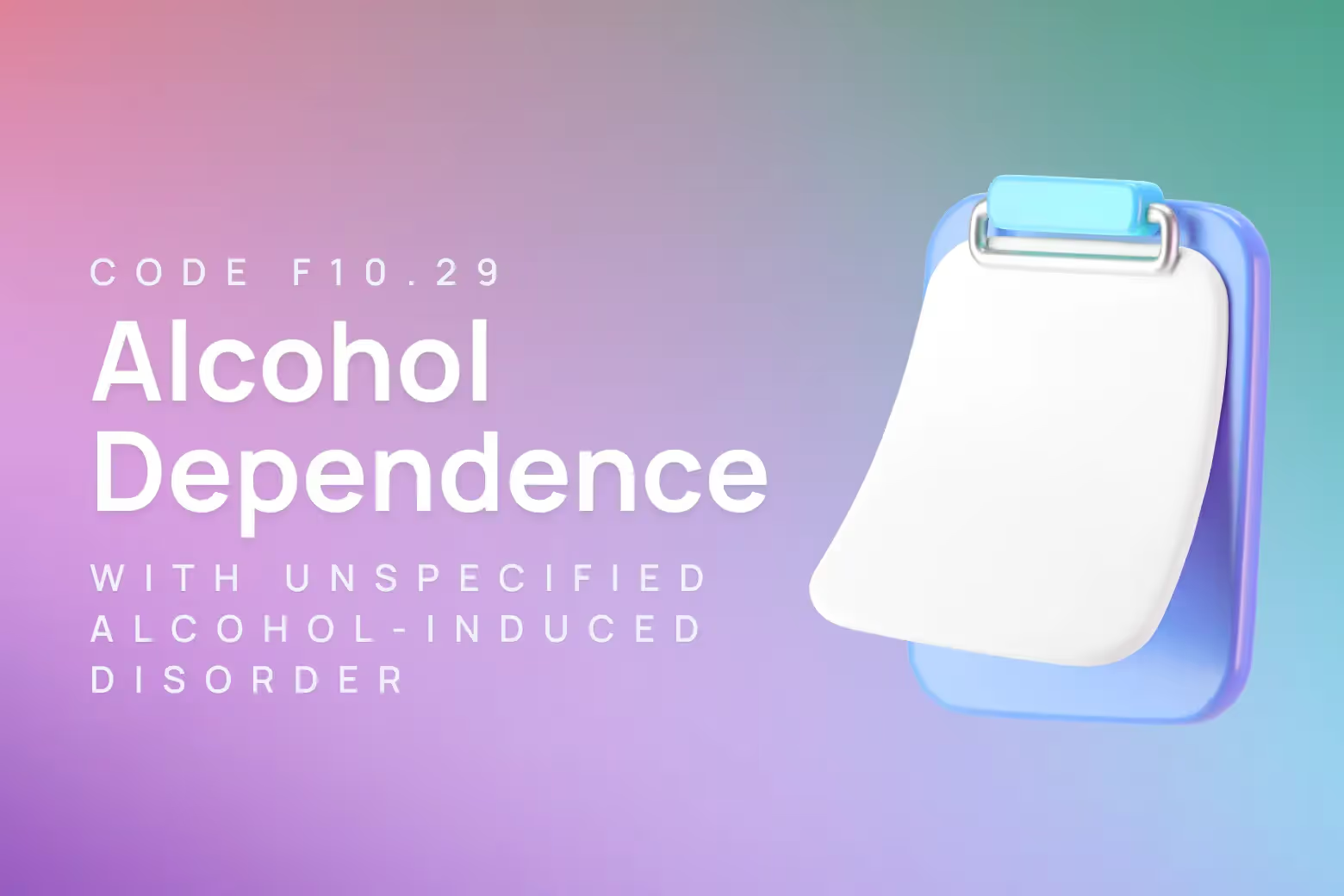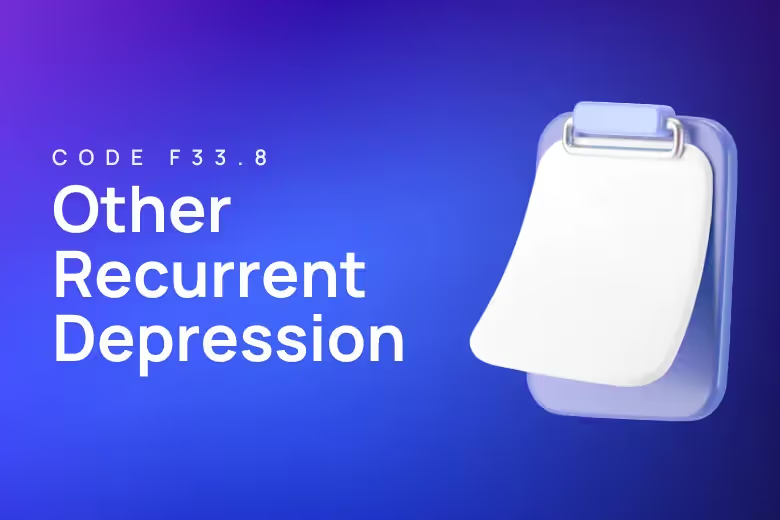ICD-10 code for alcohol dependence, with unspecified alcohol-induced disorder

F10.29 is the ICD-10 code for alcohol dependence with unspecified alcohol-induced disorder.
This code represents a complex condition where individuals meet criteria for alcohol use disorder while also experiencing psychological or physical complications directly caused by alcohol use, though the specific nature of these complications cannot be precisely identified or classified.
Accurate diagnostic coding ensures proper treatment planning and supports clinicians in addressing both the addiction and its related complications.
Key features:
- Represents alcohol dependence combined with an unspecified alcohol-related mental or physical disorder
- Requires meeting criteria for alcohol use disorder plus evidence of alcohol-induced complications
- Used when specific alcohol-induced disorders cannot be clearly identified or classified
- Critical for treatment planning that addresses both addiction and related health consequences

Diagnostic criteria for alcohol dependence with unspecified alcohol-induced disorder (F10.29)
F10.29 applies when individuals demonstrate a problematic pattern of alcohol use that meets dependence criteria while simultaneously experiencing complications that stem directly from their alcohol consumption.
The underlying alcohol dependence must manifest as clinically significant impairment or distress occurring within a 12-month period.
The foundational requirement involves demonstrating at least two symptoms from the alcohol use disorder criteria within the past year. These symptoms reflect the progressive nature of alcohol dependence and its impact on daily functioning.
Key diagnostic indicators include:
- Consuming alcohol in amounts or for periods longer than originally planned
- Persistent desire or repeated unsuccessful attempts to reduce or control alcohol consumption
- Significant time investment in obtaining, using, or recovering from alcohol's effects
- Intense craving or strong urges to use alcohol
- Repeated failure to fulfill major responsibilities at work, school, or home due to alcohol use
- Continued alcohol consumption despite persistent social or interpersonal problems caused by drinking
- Abandoning important social, occupational, or recreational activities because of alcohol use
- Recurrent alcohol use in physically dangerous situations
- Continuing alcohol use despite knowledge of persistent physical or psychological problems likely caused by alcohol
- Tolerance requiring increased amounts to achieve desired effects or experiencing diminished effects from the same amount
- Withdrawal symptoms when alcohol use ceases or alcohol taken to relieve withdrawal symptoms
The "unspecified alcohol-induced disorder" component indicates that alcohol has caused additional mental or physical health complications beyond the addiction itself, though these cannot be classified into a specific disorder category.
When to use F10.29 diagnosis code
Determining when F10.29 represents the most accurate diagnostic code requires careful evaluation of both the alcohol dependence symptoms and any concurrent alcohol-induced complications.
This differential diagnosis becomes essential when clinicians identify clear evidence of alcohol-related health problems that don't fit neatly into other specific diagnostic categories.
F10.29 vs F10.20 (Alcohol dependence, moderate to severe)
F10.29 differs from F10.20 by specifically acknowledging the presence of alcohol-induced complications beyond the core dependence symptoms.
While F10.20 focuses exclusively on the severity of alcohol use disorder symptoms (4-6+ symptoms), F10.29 recognizes additional medical or psychological conditions directly attributable to alcohol consumption.
Clinicians choose F10.29 when clients present with clear alcohol-related health issues—such as cognitive changes, mood alterations, or physical symptoms—that cannot be classified under more specific alcohol-induced disorder codes.
The key distinction lies in documenting that alcohol has caused additional complications beyond the typical dependence presentation.
F10.29 vs F10.10 (Alcohol use disorder, mild)
F10.10 represents milder forms of alcohol problems with only 2-3 symptoms and typically without significant alcohol-induced complications.
F10.29 indicates more severe consequences where alcohol has caused additional disorders requiring clinical attention.
The severity difference becomes apparent through both the number of dependence symptoms present and the emergence of alcohol-related complications affecting the individual's health or functioning.
F10.29 vs specific alcohol-induced disorder codes
When alcohol-induced complications can be specifically identified and classified, clinicians should use more precise codes rather than F10.29.
For example, if alcohol has caused a clearly identifiable depressive episode, anxiety disorder, or specific cognitive impairment, those conditions receive their own diagnostic codes.
F10.29 serves as the appropriate choice when alcohol-induced problems are evident but don't meet criteria for specific disorder categories.
Related ICD-10 codes
- F10.10 Alcohol use disorder, mild
- F10.20 Alcohol dependence, moderate to severe
- F10.21 Alcohol dependence, in remission
- F10.22 Alcohol dependence with intoxication
- F10.23 Alcohol dependence with withdrawal
- F10.24 Alcohol dependence with alcohol-induced mood disorder
- F10.25 Alcohol dependence with alcohol-induced psychotic disorder
- F10.26 Alcohol dependence with alcohol-induced persisting amnestic disorder
- F10.27 Alcohol dependence with alcohol-induced persisting dementia
- F10.28 Alcohol dependence with other alcohol-induced disorder
Interventions and CPT codes for alcohol dependence with unspecified alcohol-induced disorder
Comprehensive diagnostic evaluation and assessment
The initial evaluation serves as the foundation for effective treatment planning when addressing both alcohol dependence and unspecified alcohol-induced complications.
This comprehensive assessment explores the relationship between alcohol use patterns and emerging health problems while establishing baseline functioning across multiple domains.
Clinicians bill for the initial diagnostic evaluation using:
→ 90791 Psychiatric diagnostic evaluation
Individual psychotherapy targeting alcohol dependence
Cognitive Behavioral Therapy represents the gold standard intervention for alcohol dependence, helping clients identify triggers, develop coping strategies, and address the psychological factors contributing to both alcohol use and related complications.
CBT sessions focus on building skills to manage cravings while addressing any co-occurring mental health symptoms that may be alcohol-induced.
Motivational Interviewing serves as an essential complement to CBT, particularly valuable for clients experiencing ambivalence about change. This approach helps resolve mixed feelings about reducing alcohol use while building intrinsic motivation for recovery.
For individual therapy sessions, providers use time-based CPT codes:
→ 90832 Psychotherapy, 30 minutes
→ 90834 Psychotherapy, 45 minutes
→ 90837 Psychotherapy, 60 minutes
Family and couples therapy
Alcohol dependence significantly impacts family relationships and social functioning. Family therapy addresses these dynamics while building support systems for recovery.
This intervention proves particularly valuable when alcohol-induced complications have strained relationships or when family members need guidance on supporting recovery.
Family therapy sessions are billed using:
→ 90847 Family psychotherapy with patient present
→ 90846 Family psychotherapy without patient present
Group therapy interventions
Group psychotherapy provides peer support while addressing shared challenges in recovery from alcohol dependence.
Group settings allow clients to learn from others' experiences while developing social connections that support long-term recovery.
These interventions address both the addiction and any related complications through shared problem-solving and mutual support.
Group therapy is coded as:
→ 90853 Group psychotherapy
Screening and brief intervention services
For ongoing monitoring and brief interventions targeting alcohol use, clinicians may use SBIRT (Screening, Brief Intervention, and Referral to Treatment) approaches.
These are particularly valuable for tracking progress and addressing emerging concerns related to alcohol-induced complications.
SBIRT services are billed using:
→ 99408 Alcohol screening and brief intervention, 15-30 minutes
→ 99409 Alcohol screening and brief intervention, greater than 30 minutes
→ G0396 Alcohol structured assessment and brief intervention (Medicare)
→ G0397 Alcohol structured assessment and brief intervention, greater than 30 minutes (Medicare)
How Upheal improves F10.29 ICD-10 documentation
Suggesting appropriate ICD-10 codes based on session content
Upheal's clinical documentation platform analyzes session notes and treatment discussions to identify when clients present with both alcohol dependence symptoms and additional alcohol-related complications.
The platform recognizes patterns indicating the presence of alcohol-induced disorders that may not fit into specific diagnostic categories, helping clinicians consider F10.29 when appropriate.
The platform's intelligent coding suggestions help differentiate between standard alcohol dependence presentations and cases involving unspecified alcohol-induced complications.
This capability proves particularly valuable when clients describe symptoms that suggest alcohol-related health problems without clearly meeting criteria for specific alcohol-induced disorder diagnoses.
Maintaining HIPAA-compliant records with proper diagnostic coding
Accurate documentation of F10.29 requires careful recording of both alcohol dependence criteria and evidence of alcohol-induced complications.
Upheal enables clinicians to maintain secure, HIPAA-compliant records while ensuring that diagnostic coding accurately reflects the complex nature of alcohol dependence with associated complications.
The platform helps clinicians document the relationship between alcohol use patterns and emerging health concerns, supporting the diagnostic rationale for F10.29 coding.
This comprehensive documentation proves essential for treatment planning and insurance authorization while maintaining complete client confidentiality.
Reducing administrative burden so you can focus on client care
Complex cases involving alcohol dependence with unspecified alcohol-induced disorders require extensive documentation to support appropriate diagnosis and treatment planning.
Upheal automates much of this documentation process, allowing clinicians to spend more time conducting thorough assessments and providing therapeutic interventions rather than managing paperwork.
The platform's automated note generation captures the nuanced clinical presentations characteristic of F10.29 cases, including the interplay between addiction symptoms and alcohol-induced complications.
This documentation support proves particularly valuable when working with clients who present multiple symptoms requiring careful diagnostic consideration.
Supporting clients with alcohol dependence and unspecified alcohol-induced disorder
Working with clients who have F10.29 requires a comprehensive approach that addresses both the underlying alcohol dependence and any related complications that alcohol use has caused.
These cases often present complex clinical pictures where alcohol has created additional health problems that complicate treatment planning and recovery efforts.
The therapeutic relationship becomes particularly important when clients experience alcohol-induced complications that may affect their cognitive functioning, emotional regulation, or physical health.
Clinicians must remain flexible in their approach while maintaining clear boundaries and consistent treatment goals focused on both addiction recovery and managing alcohol-related health consequences.
Treatment planning should acknowledge that recovery may involve addressing multiple symptoms and complications simultaneously.
This complexity requires ongoing assessment and adjustment of interventions as clients progress through recovery and as alcohol-induced complications potentially improve with sustained abstinence.
Comprehensive clinical documentation platforms like Upheal can significantly improve the accuracy and efficiency of documenting these complex cases.
By automatically generating detailed progress notes that capture both addiction symptoms and related complications, clinicians can focus their attention on providing high-quality therapeutic interventions while ensuring complete and accurate documentation for F10.29 diagnoses.
Try Upheal for free to experience how intelligent documentation can support your work with complex alcohol-related disorders.













